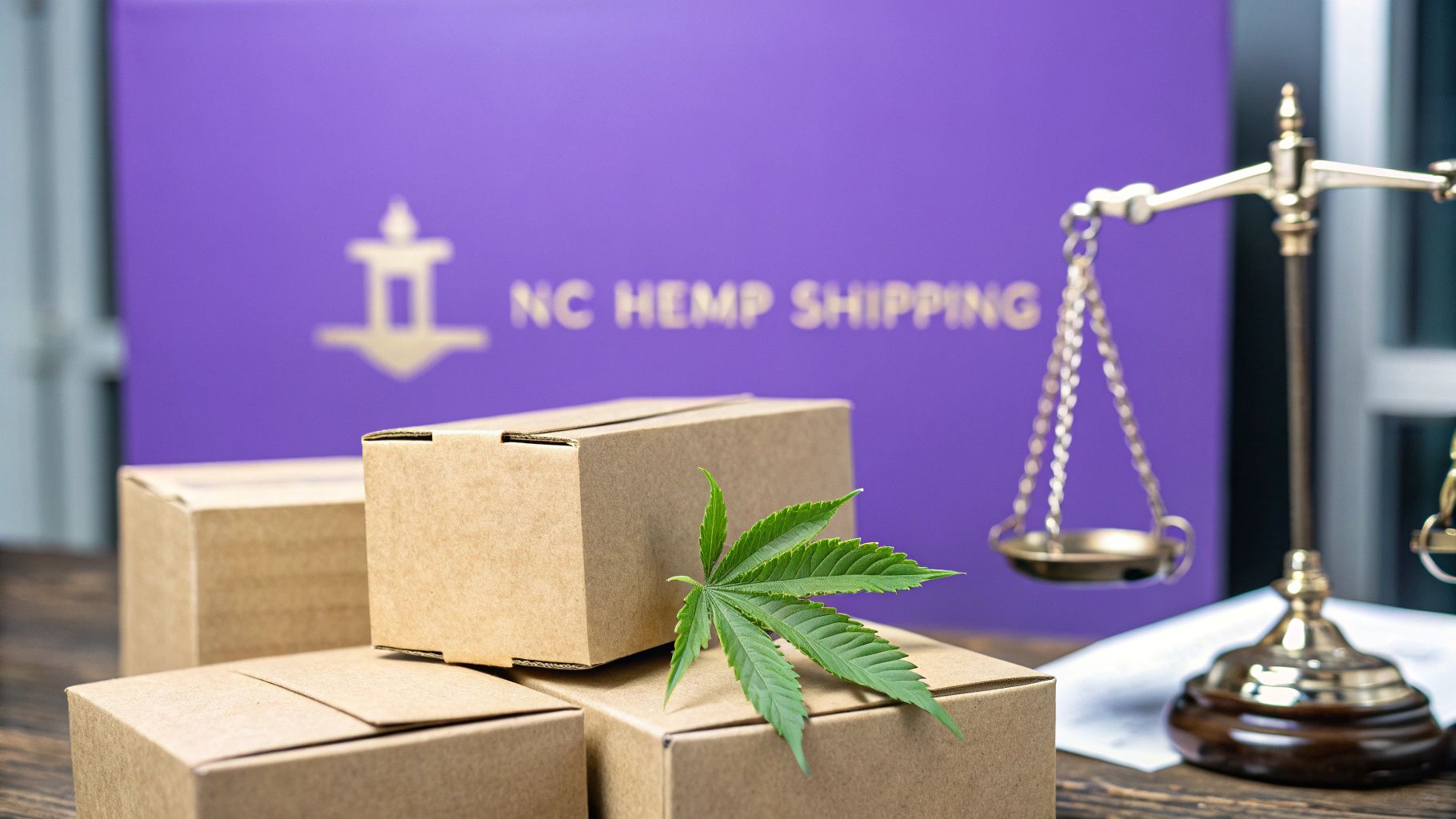
CBD/Hemp/THCA Shipping Laws North Carolina: Your Guide
Discover essential CBD/Hemp/THCA Shipping Laws North Carolina. Stay compliant, avoid errors, and confidently ship your products with expert guidance.
Cody Y.
Updated on Oct 18, 2025
Shipping CBD, hemp, and THCA products to, from, and within North Carolina is legal—as long as they play by one crucial rule. Everything hinges on the federally mandated 0.3% Delta-9 THC limit.
This single number is the green light for businesses and consumers, creating a clear path for a thriving market in the Tar Heel State. If your product's THC content is verified and documented to be at or below that threshold, you're good to ship.
Navigating North Carolina Hemp and CBD Shipping
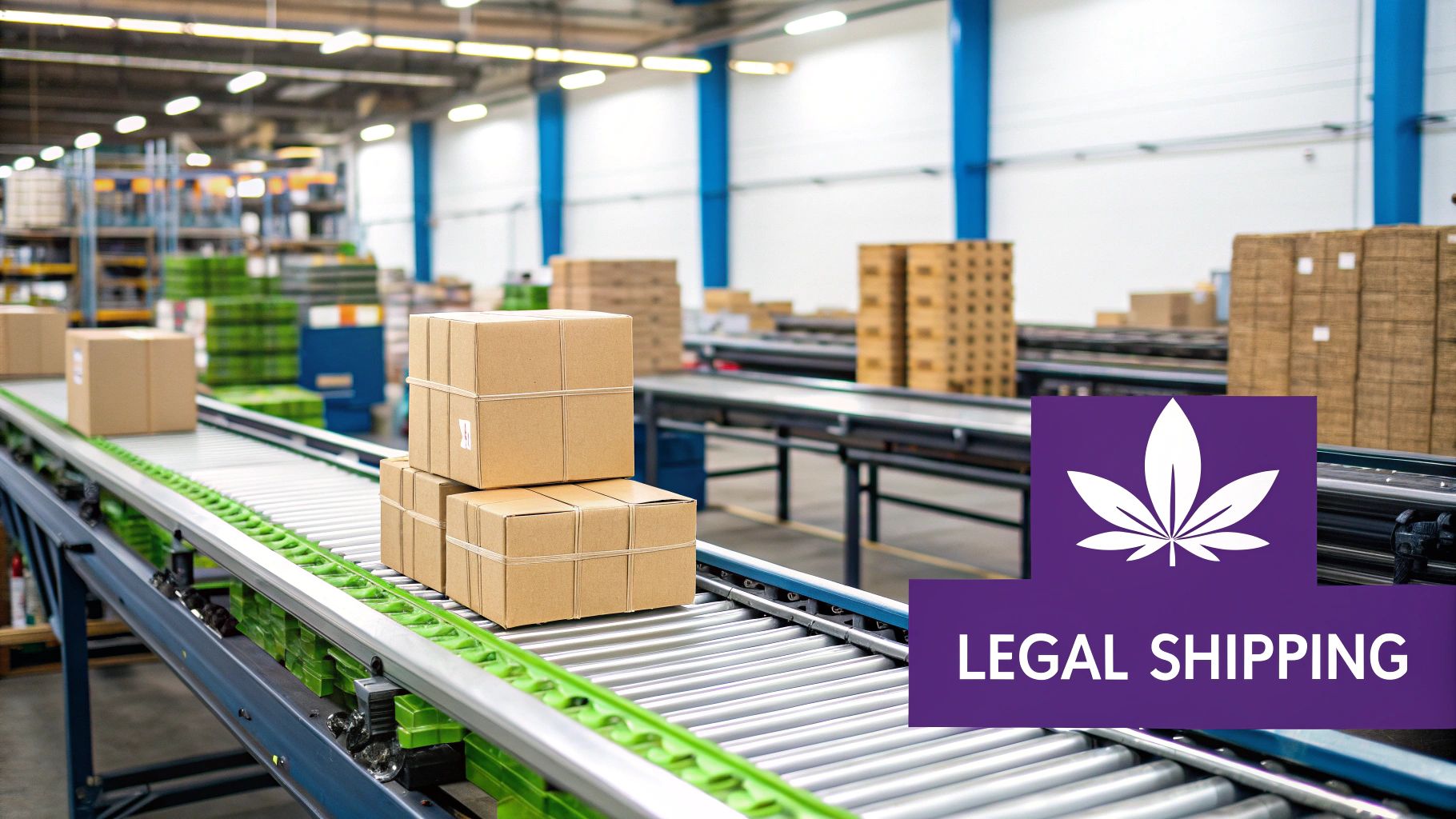
Don't let the legal jargon intimidate you; understanding the shipping laws in North Carolina is actually pretty straightforward. The state’s entire framework is built on the foundation of the federal 2018 Farm Bill. This was the landmark legislation that officially separated "hemp" from "marijuana" under the Controlled Substances Act, kicking off the legal hemp industry as we know it.
Think of the 2018 Farm Bill as the national rulebook. It established the one guideline that matters most: the concentration of Delta-9 THC, the main psychoactive component in cannabis. Any plant or product with more than 0.3% Delta-9 THC by dry weight is still considered marijuana and remains federally illegal. Anything below that line is legally defined as hemp.
State-Level Alignment with Federal Law
North Carolina didn't try to reinvent the wheel. The state legislature moved quickly to align its own laws with this federal standard, adopting the 0.3% Delta-9 THC threshold into state law. This move was critical because it created a consistent and predictable environment for everyone involved—from farmers in the field to online retailers shipping to customers.
For businesses, this means the path to compliance is clear-cut. If you can prove your products—whether it’s CBD oil, THCA flower, or industrial hemp fiber—fall below that legal THC limit, they are treated as agricultural commodities, not controlled substances.
The legal pillars supporting hemp shipping in North Carolina are solid:
- The 2018 Farm Bill: This federal law created the national 0.3% Delta-9 THC standard and legalized hemp production.
- North Carolina Senate Bill 352: This bill made things permanent by removing hemp from the state's controlled substances list, cementing its legal status.
- State Regulations: North Carolina has its own rules for licensing, testing, and labeling to ensure all products sold and shipped are safe and compliant.
This harmony between federal and state law is the bedrock of the entire industry. It gives businesses the confidence to invest and assures consumers they can legally buy and receive these products in the mail without looking over their shoulder.
Ultimately, the legality of shipping these products isn't a gray area in North Carolina. It’s a clearly defined system based on verifiable data. This guide will walk you through the specific steps you need to take—from getting your documentation in order to picking the right shipping carrier—to navigate these rules and make sure every shipment is buttoned up and fully compliant.
The Evolution of North Carolina's Hemp Regulations
To get a real handle on today's CBD, hemp, and THCA shipping laws in North Carolina, you have to look at how we got here. The state's journey from total prohibition to a regulated market didn't happen overnight. It was a careful, step-by-step process that built the foundation for the stable industry we see today.
This story really kicks off not with some sweeping legalization bill, but with a cautious experiment. That measured approach gave regulators and business owners time to learn and adapt, which was crucial for building a solid framework for the future.
The 2015 Hemp Pilot Program
The first big domino to fall was the 2015 Industrial Hemp Pilot Program. This move by the North Carolina General Assembly cracked the door open for hemp cultivation for the first time in decades. It was strictly a research-focused program, letting universities and a few licensed farmers explore hemp’s potential as an agricultural crop.
Think of it as a test flight. Before you let commercial airlines fill the skies, you need a few skilled pilots to test the plane, map the routes, and make sure everything is safe. That’s exactly what this pilot program did—it gathered data and built up knowledge around a plant that had been misunderstood for years.
This infographic lays out how the state’s initial pilot program grew into the established regulations we have now, all while guided by federal law.
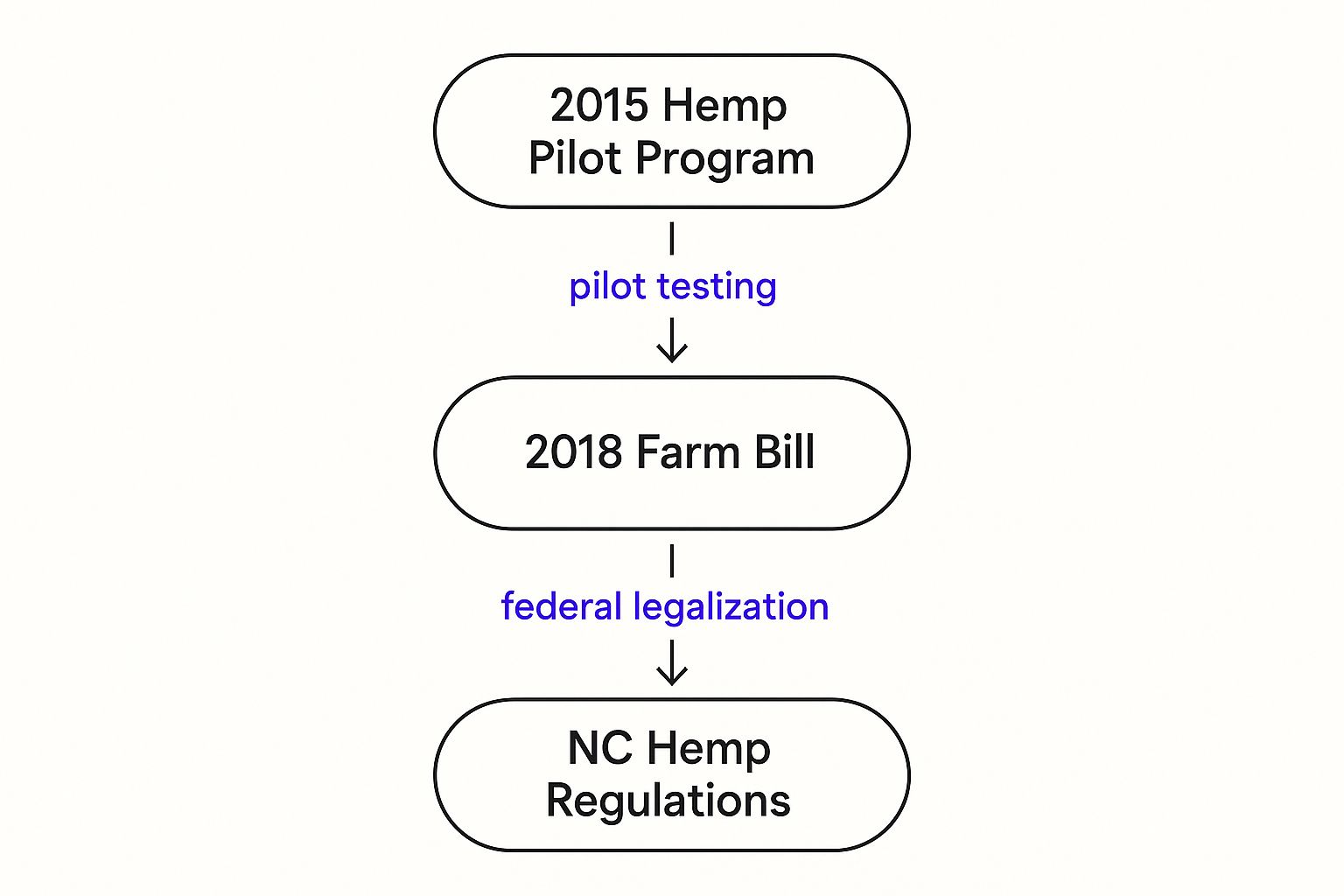
As you can see, there's a clear, logical progression. The 2015 pilot program was the essential first step that made it possible for North Carolina to smoothly align with the 2018 Farm Bill when it arrived.
Aligning with the 2018 Farm Bill
The next game-changer came from Washington D.C. with the federal 2018 Farm Bill. This landmark piece of legislation officially took hemp off the list of controlled substances, creating a legal distinction between it and marijuana based on THC content. It established the now-famous 0.3% Delta-9 THC limit as the national standard.
This was the green light North Carolina was waiting for. Because the state already had a working framework from its pilot program, it was ready to fully embrace legal hemp. Lawmakers quickly moved to permanently sync up state law with the federal definition, a critical move that gave the budding industry some much-needed long-term certainty.
This didn't just solidify the legal status of the hemp plant itself, but also all its derivatives—including popular products like CBD and emerging ones like THCA—as long as they stayed under that THC threshold. For a deeper look at the nuts and bolts of these rules, check out our guide on general https://shiprestrict.com/blog/shipping-restrictions/hemp-shipping-rules-and-restrictions.
From Temporary to Permanent Status
The final piece of the puzzle clicked into place in 2022 when North Carolina lawmakers passed Senate Bill 455. This bill made the state’s hemp program permanent, erasing any lingering doubts about its future. It officially separated "hemp" and "hemp products" from the state's legal definition of marijuana, cementing their status as legitimate agricultural commodities.
Thanks to this journey, North Carolina has been a leader in sensible hemp regulation since its pilot program in 2015. The state’s laws now fully permit the sale and use of CBD products that stick to the 0.3% THC limit. As of 2022, all hemp products are effectively legal, putting the state in line with the national standard set by the 2018 Farm Bill.
This whole legislative history drives home a key point for any business in this space: these laws are not set in stone.
The constant evolution from a pilot program to a permanent legal framework underscores the importance of staying informed. What is compliant today might change tomorrow, making adaptability a core business requirement.
Given how dynamic hemp regulations can be, understanding effective strategies for managing regulatory changes is absolutely essential for staying compliant. This history gives you the context for why today’s shipping laws look the way they do and highlights the need to always keep your finger on the pulse.
Understanding What You Are Shipping: CBD vs. THCA
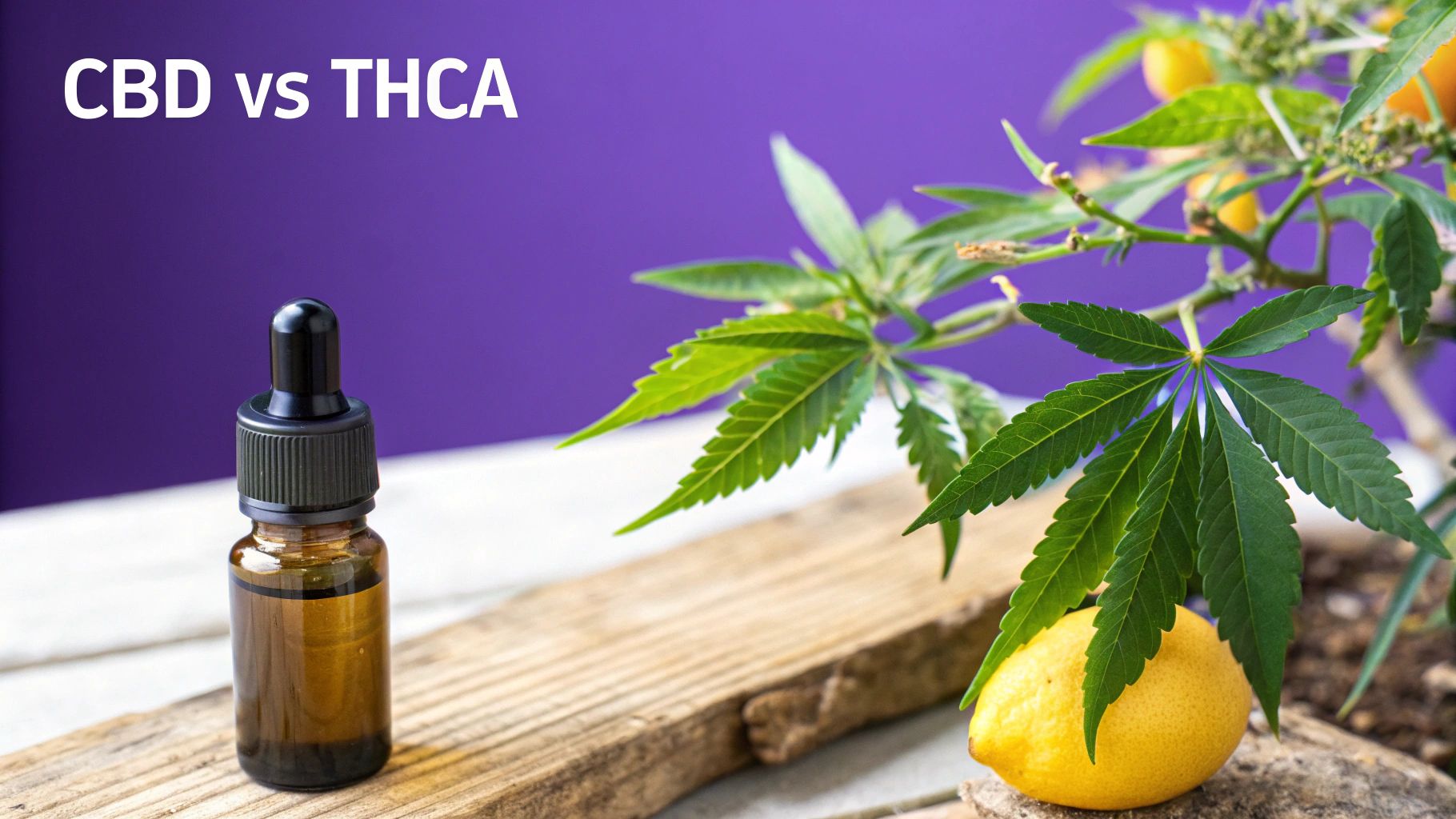
Before you can even think about building a compliant shipping strategy, you have to know exactly what you’re sending. Shipping a bottle of CBD oil isn’t the same as sending THCA flower, and both are entirely different from shipping raw hemp biomass.
The legal lines here are subtle but absolutely critical. And they all trace back to one golden rule in North Carolina: the 0.3% Delta-9 THC concentration limit.
Let’s break this down with an analogy. Think of the cannabis plant as a versatile citrus tree. From this single tree, you get several distinct products, each with its own quirks and purpose. Getting a handle on their individual traits is the first step to mastering CBD, hemp, and THCA shipping laws in North Carolina.
CBD Is Your Lemonade
Cannabidiol, or CBD, is like the lemonade you make from that citrus tree. It’s a refined, non-intoxicating product that millions of people use for wellness and relaxation. Just like lemonade gives you the bright flavor of the fruit without the intense pucker of biting into a whole lemon, CBD offers many of the plant's benefits without the psychoactive effects of Delta-9 THC.
When you ship CBD products, you’re dealing with a processed extract. The legal focus is straightforward: the final product—whether it’s oil, edibles, or topicals—must contain less than 0.3% Delta-9 THC.
Hemp Is the Whole Lemon
Hemp itself is the whole lemon—the raw agricultural commodity. It’s incredibly versatile. The fibrous stalk can be used for textiles and building materials, while the seeds are a food source. The entire plant, from root to tip, is legally considered hemp as long as its Delta-9 THC level stays below that magic number.
When you're shipping raw hemp flower or biomass, you’re shipping the foundational ingredient. This is where your paperwork, especially the Certificate of Analysis (COA), becomes paramount. It proves the raw material itself is legal before it’s ever turned into something else.
THCA Is the Concentrated Extract
Now for THCA (Tetrahydrocannabinolic Acid). In our analogy, THCA is like a potent, concentrated lemon extract. In its raw, unheated form, it's non-intoxicating, just like the rest of the hemp plant. It is simply the acidic precursor to Delta-9 THC.
The legal nuance with THCA comes from what happens when you heat it—a process called decarboxylation. Heat converts THCA into the intoxicating Delta-9 THC. It’s this potential for conversion that puts THCA under such close scrutiny.
The key takeaway is that under North Carolina and federal law, the legality of THCA is determined by the Delta-9 THC content of the product as sold, not what it could potentially become. As long as the product itself contains less than 0.3% Delta-9 THC, it is legally defined as hemp.
This distinction is crucial for anyone in the business. When it comes to THCA shipping laws, North Carolina's legal landscape is pretty favorable. Since THCA derived from hemp is federally legal (as long as it meets the Delta-9 THC threshold), and North Carolina hasn't passed any specific laws to restrict it, businesses can ship here with confidence. All you have to do is follow the federal guidelines.
This puts the Tar Heel State alongside other compliant states where the market is more open. You can get a deeper dive into North Carolina’s specific stance on THCA legality and shipping on blacktiecbd.net.
To make these differences even clearer, let's lay them out side-by-side.
CBD vs Hemp vs THCA Legal Status In North Carolina
| Attribute | CBD (Cannabidiol) | Hemp | THCA (Tetrahydrocannabinolic Acid) |
|---|---|---|---|
| Primary Form | Processed extract (oils, edibles, topicals) | Raw agricultural plant material (flower, fiber, seeds) | Crystalline isolate or concentrated in raw flower |
| Psychoactivity | Non-intoxicating | Non-intoxicating | Non-intoxicating in its raw state |
| Key Legal Factor | Final product must contain < 0.3% Delta-9 THC | Entire plant must contain < 0.3% Delta-9 THC by dry weight | Final product must contain < 0.3% Delta-9 THC |
| Primary Use Case | Wellness and therapeutic benefits | Industrial (textiles, food) and raw material for extracts | A legal alternative to THC, converts to THC when heated |
| Shipping Focus | Product labeling and lab results for the final product | Certificate of Analysis (COA) for the raw plant material | Lab reports (COAs) proving low Delta-9 THC content |
Knowing the precise nature of your product—whether it’s the finished lemonade, the raw lemon, or the potent extract—is everything. It dictates your compliance, labeling, and documentation needs, preventing costly mistakes and ensuring your shipments navigate North Carolina's legal landscape without a hitch.
Your North Carolina Hemp Shipping Compliance Checklist
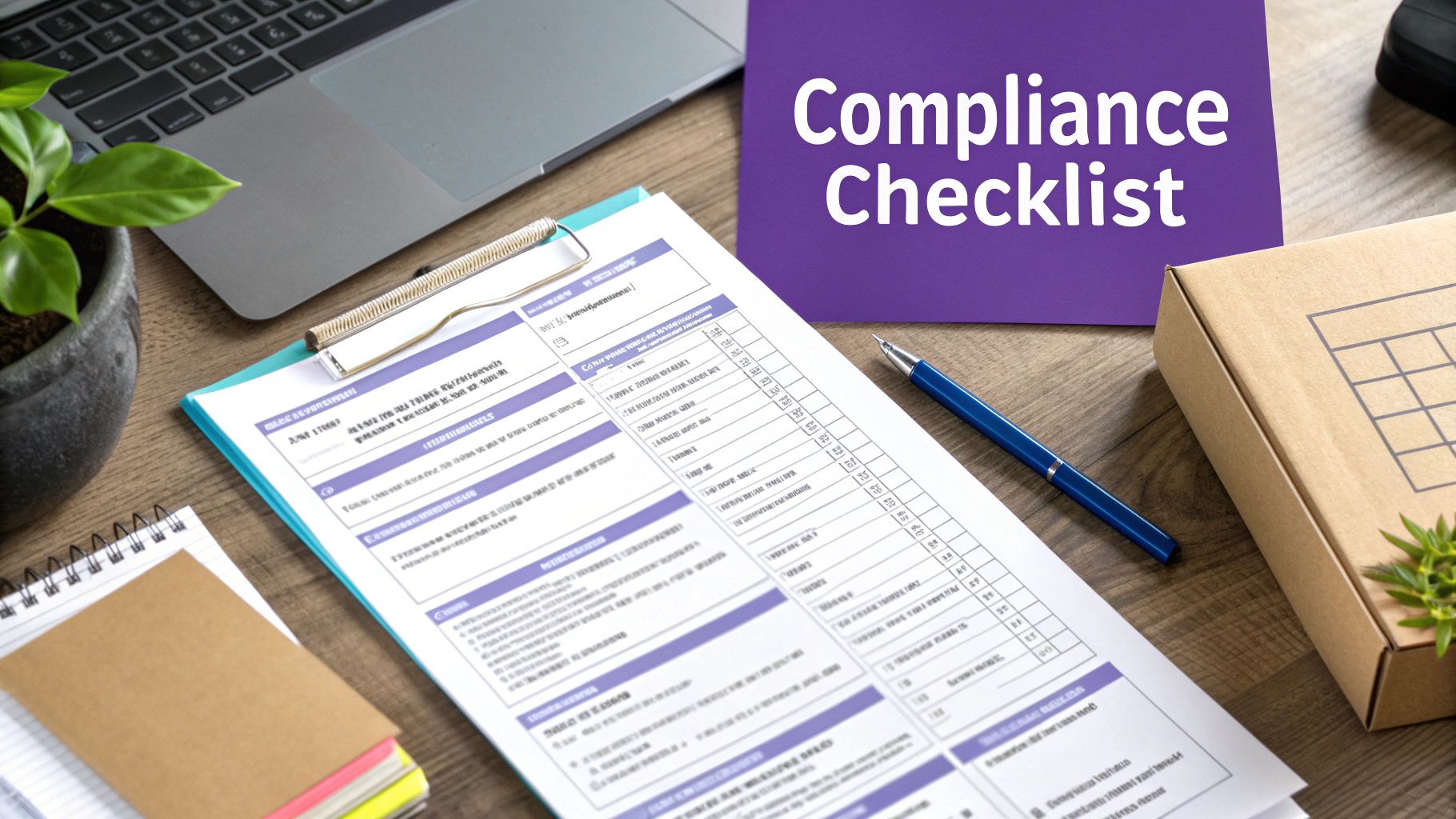
Trying to ship hemp products in North Carolina without a solid process is just asking for trouble. This isn't about memorizing dense legal text; it's about having a repeatable game plan.
Think of this checklist as your pre-flight inspection before every single package goes out the door. Following these steps consistently turns complex rules into a simple, defensible routine that protects your business from seized shipments, delays, and legal headaches.
Step 1 Master Your Documentation
Your paperwork is your first and best line of defense. A perfectly legal shipment can get flagged as a controlled substance if you don't have the right documents to prove otherwise.
Every package you ship needs what I call a "compliance packet." At the heart of this packet is a current Certificate of Analysis (COA). This isn’t just a formality—it’s the scientific proof that your product is legal hemp, and it must come from a third-party, DEA-registered lab. Most importantly, it has to clearly show a Delta-9 THC concentration at or below the federal 0.3% limit.
Here's what goes into every compliance packet:
- A full-panel Certificate of Analysis: Make sure it matches the exact product batch in the box.
- A notice to law enforcement: This is a simple letter explaining the contents are legal industrial hemp, compliant with the 2018 Farm Bill and North Carolina law.
- Your business license or permit: A copy of your state-issued hemp processor or retailer license shows you're a legitimate operator.
A complete and accurate COA is non-negotiable. It is the single most important document for proving the legality of your CBD, hemp, or THCA shipment and is your best defense against potential misunderstandings with carriers or law enforcement.
Step 2 Perfect Your Product Labeling
Clear, compliant labeling does more than just inform your customer. It’s a signal of transparency to regulators and law enforcement, showing that you know the rules and follow them.
Your labels need to be precise, leaving no room for guesswork. A QR code is now standard practice and should be featured prominently on every product. This code needs to link directly to the COA for that specific product batch, allowing anyone with a smartphone to instantly verify its contents and legality.
Beyond the QR code, your labels must clearly state:
- The exact amount of cannabinoids, especially total THC and CBD content.
- An explicit statement that the product contains less than 0.3% Delta-9 THC.
- The manufacturer's name and contact information.
This level of detail builds trust with customers and can breeze you through any potential inspection.
Step 3 Implement Strong Age and Shipping Verification
Compliance doesn't stop with the product itself. It's also about who you sell to and where you ship. With North Carolina lawmakers zeroing in on consumer safety, preventing sales to minors is mission-critical.
You absolutely need a reliable age verification system on your website. This usually means using a third-party tool at checkout to confirm a customer's age before the sale is completed.
For merchants using platforms like WooCommerce, managing state-by-state rules is just as important. You may need to block certain products from being shipped to specific zip codes where local laws are stricter. You can get into the weeds by reading our guide on managing CBD and hemp shipping restrictions in WooCommerce.
The growing demand for these products has put them under a microscope. North Carolina's recent legislative proposals for mandatory testing and oversight show a clear trend toward stricter enforcement. This is actually good news for legitimate businesses, as it helps create a more secure market. You can read more about the state's move toward comprehensive hemp regulation on natlawreview.com.
Step 4 Choose Your Shipping Carrier Wisely
Not all shipping carriers treat hemp the same. While USPS, UPS, and FedEx all technically permit shipping legal hemp products, each has its own set of hoops to jump through.
- USPS: The United States Postal Service has been the go-to for many since the 2018 Farm Bill passed. While they require you to keep COAs on file for at least two years, they don't mandate one in every box. Still, including it is the smartest move you can make.
- UPS & FedEx: As private companies, they have their own internal rules. It’s crucial to check their latest terms of service for hemp and CBD to ensure your packaging and paperwork are up to their standards, which can change.
Always, always use plain, discreet packaging. Slapping a cannabis leaf logo on your box is just asking for it to be opened and inspected. The goal is to be professional and compliant, not to advertise the contents to every person who handles the package. Follow this checklist, and you’ll build a shipping process that’s not just legal but also smooth and secure.
Common Shipping Mistakes and How to Avoid Them
<iframe width="100%" style="aspect-ratio: 16 / 9;" src="https://www.youtube.com/embed/cZyJsD6-Xcs" frameborder="0" allow="autoplay; encrypted-media" allowfullscreen></iframe>Knowing the CBD, hemp, and THCA shipping laws in North Carolina is a great start, but the real test is avoiding the common tripwires that snag other businesses. A single, simple oversight can get your packages seized, leave you with angry customers, and even land you in legal hot water.
The quickest way to build a bulletproof shipping operation is to learn from the mistakes others have already made. These aren't complex legal loopholes; they're basic process failures that are surprisingly easy to prevent with a little forethought.
The most successful brands aren't just compliant—they're prepared. They anticipate the points of failure and build systems to head them off, making sure every single package they send out is beyond reproach.
Incomplete or Outdated Documentation
By far the most common and costly mistake is shipping with a weak paper trail. Think about it: you're sending a perfectly legal product in a box that might as well be screaming "illegal substance" all because you forgot the right paperwork.
A missing or outdated Certificate of Analysis (COA) is a massive red flag for carriers and law enforcement. A COA from six months ago is useless for a product you just packaged; it must match the specific batch inside the box. Without that current proof, your legal hemp is indistinguishable from illicit marijuana to an inspector.
The solution is to create a standardized "compliance packet" that goes into every single shipment. This isn't optional; it's mission-critical.
- Current, Batch-Specific COA: Always print and include the lab report for the exact product batch you're shipping.
- Notice to Law Enforcement: Include a clear, one-page letter stating the package contains legal industrial hemp compliant with the 2018 Farm Bill.
- Business Credentials: A copy of your hemp license proves you're a legitimate, registered business.
This packet is your shipment's passport. It clears the way and instantly answers the questions any inspector is trained to ask.
Ignoring Out-of-State Regulations
Your products might be perfectly legal to sell and ship within North Carolina, but the journey doesn't stop at the state line. A huge pitfall is failing to check the laws of the destination state. Shipping THCA flower from Asheville to a state where it's explicitly banned is a recipe for disaster.
Regulations vary wildly from one state to the next. Some states have "total THC" laws that essentially ban most THCA products by calculating the final THC content after heating. Others have unique licensing or labeling rules you have to follow.
Simply complying with North Carolina law is not enough. The regulations of the destination state, county, and even city govern the legality of the delivery. A sale is only successful if the product legally arrives in the customer's hands.
This is where automated tools become a lifesaver. Trying to manually check the rules for every single order is a fast track to burnout and mistakes. You need a system that verifies shipping eligibility before the customer can even complete their purchase. This protects your business and saves the buyer from a frustrating cancellation. Understanding that compliance goes beyond state borders is critical; for more on this, check out our article on county-level shipping restrictions.
Using Improper or Suspicious Packaging
Many businesses hear "discreet packaging" and just grab a plain brown box. But sometimes, trying too hard to be discreet can seriously backfire. Using excessive tape, wrapping everything in layers of plastic, or adding strong odor-masking scents can make a package look suspicious and practically begs for an inspection.
The goal is to look professional, not paranoid. Your packaging should be sturdy, plain, and give zero clues about its contents. Avoid any cannabis-related imagery, slang, logos, or brand names on the outside of the box.
The best practice is dead simple:
- Use a standard, new cardboard box.
- Seal it professionally with normal packing tape.
- Make sure the shipping label is clear and accurate.
Inside, your products should be in their professional, sealed retail packaging. By sidestepping these common blunders, you can ship with confidence, build a reputation for reliability, and ensure your products reach customers without a hitch.
North Carolina Hemp & THCA Shipping: Your Questions Answered
Even when you know the rules, real-world questions pop up. When it comes to the specifics of CBD, hemp, and THCA shipping laws in North Carolina, getting straight answers to common sticking points can save you a world of headaches and prevent expensive mistakes. Let's tackle the questions we hear most often from both businesses and consumers.
Think of this as your cheat sheet for navigating North Carolina's hemp shipping landscape. We’ve got the answers to keep your operations running smoothly and, most importantly, compliantly.
Can I Legally Get THCA Flower Mailed to Me in NC?
Yes, you absolutely can. As long as the THCA flower comes from legal hemp and contains less than 0.3% Delta-9 THC by dry weight, it's considered a lawful hemp product under both federal and North Carolina law.
Any reputable seller will tuck a Certificate of Analysis (COA) into the shipment to prove it meets the legal standard. That little piece of paper is your key to a worry-free delivery.
What Should I Do If My Legal Hemp Shipment is Seized?
First things first: stay calm and professional. If a carrier like USPS, UPS, or FedEx seizes a package you know is compliant, immediately get in touch with them. Have all your documentation ready to go—the COA, your business license, and the notice to law enforcement that should have been included in the box.
More often than not, a seizure is just a misunderstanding, usually stemming from a poorly labeled or documented package. Providing clear, verifiable proof of the product's legality is the fastest way to clear things up and get your shipment back on track.
Your documentation is your best defense. A well-organized compliance packet can turn a potential seizure into a minor delay by immediately proving the shipment is legal.
Do I Need a Special License Just to Ship Hemp Products from NC?
If you're a business in North Carolina that processes, handles, or sells hemp products, you must be licensed under the North Carolina Department of Agriculture & Consumer Services' Hemp Program. This license is your official proof that you're a legitimate, state-approved operator.
While there's no separate "shipping license," your processor or retailer license is the non-negotiable foundation for legally mailing these products. On the flip side, if you're just a consumer receiving products for personal use, you don't need any license at all.
Are There Limits on How Much CBD I Can Have Shipped to My House?
As of now, North Carolina doesn't set any specific limits on the amount of legal CBD, hemp, or THCA products a consumer can buy or have shipped for personal use. The law cares about the THC concentration, not the size of your order.
This means you can stock up on as much as you need, just as long as every single product in that shipment stays below the 0.3% Delta-9 THC threshold.
Keeping up with the complex web of state and local shipping rules is a full-time job for any business selling regulated products. Ship Restrict takes the guesswork out of compliance by letting you build granular shipping rules for any state, county, or ZIP code. Stop worrying about compliance and start growing your business with Ship Restrict.

Cody Yurk
Founder and Lead Developer of ShipRestrict, helping e-commerce businesses navigate complex shipping regulations for regulated products. Ecommerce store owner turned developer.